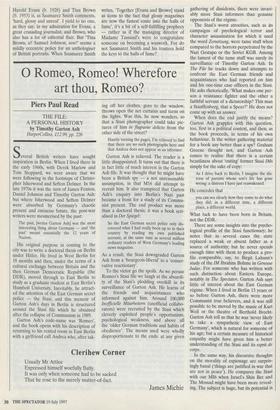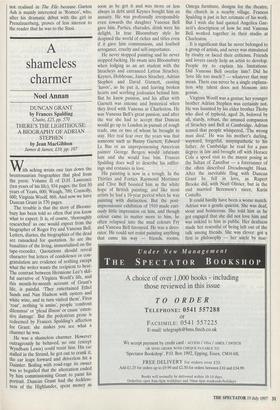0 Romeo, Romeo! Wherefore art thou, Romeo?
Piers Paul Read
THE FILE: A PERSONAL HISTORY by Timothy Garton Ash HarperCollins, L12.99, pp. 226 Several British writers have sought inspiration in Berlin. When I lived there in the early 1960s, with Derek Marlow and Tom Stoppard, we were aware that we were following in the footsteps of Christo- pher Isherwood and Sefton Delmer. In the late 1970s it was the turn of James Fenton, Daniel Johnson and Timothy Garton Ash: but where Isherwood and Sefton Delmer were absorbed by Germany's chaotic present and ominous future, the post-war writers were mesmerised by the past:
The past, [writes Garton Ash] was the most interesting thing about Germany — and 'the past' meant essentially the 12 years of Nazism.
His original purpose in coming to the city was to write a doctoral thesis on Berlin under Hitler. He lived in West Berlin for 18 months and then, under the terms of a cultural exchange between Britain and the then German Democratic Republic (the DDR), moved through to East Berlin to study as a graduate student at East Berlin's Humbolt University. Inevitably, he attract- ed the attention of the East German secret police — the Stasi; and this memoir of Garton Ash's days in Berlin is structured around the Stasi file which he obtained after the collapse of Communism in 1989.
Garton Ash's code-name was 'Romeo', and the book opens with his description of returning to his rented room in East Berlin with a girlfriend call Andrea who, after tak- ing off her clothes, goes to the window, throws open the net curtains and turns on the lights. Was this, he now wonders, so that a Stasi photographer could take pic- tures of him in flagrante delicto from the other side of the street?
Hastily turning the pages, I'm relieved to find that there are no such photographs here and that Andrea does not appear as an informer.
Garton Ash is relieved. The reader is a little disappointed. It turns out that there is in fact little of much interest in the Garton Ash file. It was thought that he might have been a British spy — a not unreasonable assumption, in that M16 did attempt to recruit him. It also transpired that Garton Ash's enquiry into Berlin's Nazi past became a front for a study of its Commu- nist present. The end product was more than a doctoral thesis; it was a book seri- alised in Der Spiegel:
So the East German secret police only dis- covered what I had really been up to in their country by reading my own published account, at the same time as several million ordinary readers of West Germany's leading news magazine.
As a result, the Stasi downgraded Garton Ash from a 'bourgeois-liberal' to a 'conser- vative reactionary'.
To the victor go the spoils. As we peruse Romeo's Stasi file we laugh at the absurdi- ty of the Stasi's plodding overkill in its surveillance of Garton Ash. He learns of the friends and acquaintances who informed against him. Around 100,000 Inofficielle Mitarbeitem (unofficial collabo- rators) were recruited by the Stasi which cleverly exploited people's opportunism, psychological weakness, and above all the 'older German traditions and habits of obedience'. The means used were wholly disproportionate to the ends: at any given gathering of dissidents, there were invari- ably more Stasi informers than genuine opponents of the regime.
The Stasi's worst atrocities, such as its .campaigns of psychological terror and character assassination for which it used the word Zersetzung, were tame stuff when compared to the horrors perpetrated by the Nazi Gestapo or the Soviet KGB. Among the tamest of the tame stuff was surely its surveillance of Timothy Garton Ash. In The File he tracks down and attempts to confront the East German friends and acquaintances who had reported on him and his one-time case officers in the Stasi. He asks rhetorically, 'What makes one per- son a resistance fighter and the other a faithful servant of a dictatorship? This man a Stauffenberg, that a Speer?' He does not come up with an answer.
When does the end justify the means? Garton Ash grapples with this question, too, first in a political context, and then, as the book proceeds, in terms of his own behaviour. Is the writer gathering material for a book any better than a spy? Graham Greene thought not, and Garton Ash comes to realise that there is a certain beastliness about 'outing' former Stasi /Ms simply for the sake of copy:
As I drive back to Berlin, I imagine the dis- tress of parents whose son's life has gone wrong: a distress I have just reawakened.
He concedes that
you can see clearly how they come to do what they did: in a different time, a different place, a different world.
What luck to have been born in Britain, not the DDR.
There are some insights into the psycho- logical profile of the Stasi functionary; he notes that in several cases the state replaced a weak or absent father as a source of authority; but he never spends enough time with them to produce a pro- file comparable, say, to Birgit Lahann's study of the IM Ibrahim Bohme in Genosse Judas. For someone who has written with such distinction about Eastern Europe, notably in The Spectator, Garton Ash says little of interest about the East German regime. When I lived in Berlin 15 years or so before Garton Ash, there were more Communist true believers, and it was still possible to be moved by the music of Kurt Well or the theatre of Berthold Brecht. Garton Ash tell us that he was 'never likely to take a sympathetic view of East Germany', which is natural for someone of his age; but a certain measure of historical empathy might have given him a better understanding of the Stasi and its esprit de corps.
In the same way, his discursive thoughts on the morality of espionage are surpris- ingly banal ('things are justified in war that are not in peace'). He compares the Stasi with our MI6 when Israel's Shin Bet and The Mossad might have been more reveal- ing. The subject is huge, but its potential is not realised in The File because Garton Ash is mainly interested in 'Romeo', who, after his dramatic debut with the girl in Prenzlauerberg, proves of less interest to the reader that he was to the Stasi.



























































 Previous page
Previous page